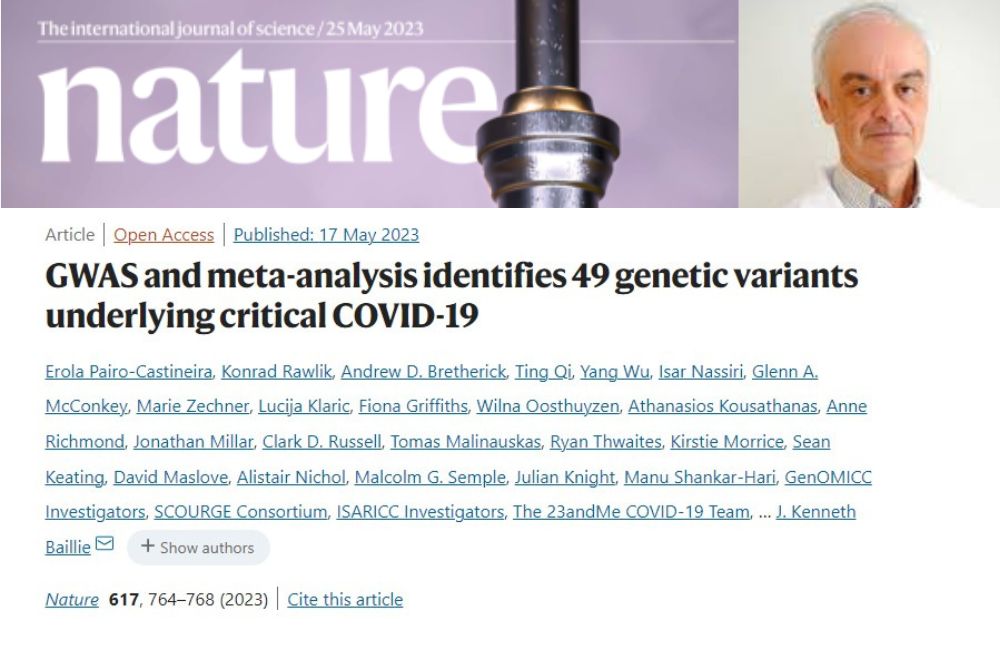The study, published in the prestigious scientific journal, opens the door to the development of new treatments
Researchers from the Marqués de Valdecilla University Hospital (HUMV) and the Marqués de Valdecilla Research Institute (IDIVAL) are participating in an international genetic study published in the journal Nature that reveals new therapeutic targets that could facilitate the development of new treatments to treat COVID-19 infection.
The study, led by researchers from the United Kingdom in collaboration with three international consortia, has counted with the participation of José Antonio Riancho, coordinator of the study in the region in Cantabria, and the infectious diseases, pneumology or immunology services of HUMV together with numerous research centers, universities and Spanish hospitals.
More than 20,000 cases of patients with COVID-19 were examined in order to explore the relationship of genetic differences in different cohorts of patients with severe complications of the infection. The analysis identified 49 gene variants of which 16 were previously unknown. These results help to better understand the mechanisms of the interaction between the virus causing the infection and the human organism, which could open the door to the development of new systems for predicting the severity of the disease.
The identification of these variants has been possible thanks to a genome-wide association study (GWAS) and the analysis of nearly one million genetic variations known as single nucleotide polymorphisms (SNPs). Comparison of the data in patients with severe COVID-19, patients with mild disease and healthy individuals has provided new insights into susceptibility to different types of the virus, confirming the relevance of genetics to the prognosis and severity of infection.
Some of these genetic variants are found in “actionable” genes, whose activity can be modified by various drugs. These include, for example, genes of the JAK signaling pathway, genes that modulate macrophage activation and vascular permeability (PDE4A), or genes involved in virus entry and replication (such as TMPRSS2 and RAB2A). These results could also help to establish new therapeutic strategies.
An international study
The project, led by the University of Edinburgh, involved three international consortia GenOMICC UK, ISARIC4C and SCOURGE. The aim of SCOURGE, funded by the Instituto de Salud Carlos III, is to analyze biomarkers of evolution and prognosis that can have an immediate impact on clinical management and therapeutic decisions in patients with the virus.
Referencia: GWAS and meta-analysis identifies 49 genetic variants underlying critical COVID-19. Nature. 2023 May 17. Online ahead of print. Erola Pairo-Castineira, Konrad Rawlik, Andrew D Bretherick, Ting Qi, Yang Wu, Isar Nassiri, Glenn A McConkey, Marie Zechner, Lucija Klaric, Fiona Griffiths, Wilna Oosthuyzen, Athanasios Kousathanas, Anne Richmond, Jonathan Millar, Clark D Russell, Tomas Malinauskas, Ryan Thwaites, Kirstie Morrice, Sean Keating, David Maslove, Alistair Nichol, Malcolm G Semple, Julian Knight, Manu Shankar-Hari, Charlotte Summers, Charles Hinds, Peter Horby, Lowell Ling, Danny McAuley, Hugh Montgomery, Peter J M Openshaw, Colin Begg, Timothy Walsh, Albert Tenesa, Carlos Flores, José A Riancho, Augusto Rojas-Martinez, Pablo Lapunzina; GenOMICC Investigators; SCOURGE Consortium; ISARICC Investigators; andMe COVID-19 Team; Jian Yang, Chris P Ponting, James F Wilson, Veronique Vitart, Malak Abedalthagafi, Andre D Luchessi , Esteban J Parra, Raquel Cruz, Angel Carracedo, Angie Fawkes, Lee Murphy, Kathy Rowan, Alexandre C Pereira, Andy Law , Benjamin Fairfax, Sara Clohisey Hendry, J Kenneth Baillie. PMID: 37198478 DOI: 10.1038/s41586-023-06034-3





















